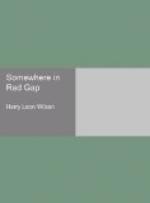Uncle Abner yawned and stretched his sun-baked form with weary rectitude. Then he looked with pleased dismay into the face of his silver watch.
“Now, I snum! Here she’s two-thirty! Don’t it beat all how time flits by, as it were, when you meet a good conversationalist and get started on various topics! Well, I guess like as not I better amble along over toward the little shop and see if they ain’t some little thing to be puttered at round there. Yes, sir; all play and no work makes Jack a dull boy, as the saying is.”
The honest fellow achieved a few faltering paces in the general direction of his shop. Then he turned brightly.
“A joke’s a joke, all right; but, after all, I hate to see old Pete working hisself into the grave that way, even if he ain’t a regular human being. Suppose you loaf over there and put him wise that the Madam’s been off the place since sunup. The laugh’s on him enough already.”
Which showed that Uncle Abner had not really a bad heart. And I did even as he had said.
* * * * *
Pete was instantly stilled by my brief but informing speech. He leaned upon his axe and gazed at me with shocked wonder. The face of the American Indian is said to be unrevealing—to be a stoic mask under which his emotions are ever hidden. For a second time this day I found tradition at fault. Pete’s face was lively and eloquent under his shock of dead-black hair—dead black but for half a dozen gray or grayish strands, for Pete’s eighty years have told upon him, even if he is not yet sufficiently gray at the temples to be a hero in a magazine costing over fifteen cents. His face is a richly burnished mahogany and tells little of his years until he smiles; then from brow to pointed chin it cracks into a million tiny wrinkles, an intricate network of them framing his little black eyes, which are lashless, and radiating from the small mouth to the high cheek bones of his race.
His look as he eyed me became utter consternation; then humour slowly lightened the little eyes. He lifted the eyes straight into the glare of the undimmed sun; nor did they blink as they noted the hour. “My good gosh!” he muttered; then stalked slowly round the pile of stove wood that had been spreading since morning. He seemed aggrieved—yet humorously aggrieved—as he noted its noble dimensions. He cast away the axe and retrieved some outflung sticks, which he cunningly adjusted to the main pile to make it appear still larger to the casual eye.
“My good gosh!” he muttered again. “My old mahala she tell me Old Lady Pettengill go off early this morning; but I think she make one big mistake. Now what you know about that?” He smiled winningly now and became a very old man indeed, the smile lighting the myriad minute wrinkles that instantly came to life. Again he ruefully surveyed the morning’s work. “I think that caps the climax,” said he, and grimanced humorous dismay for the entertainment of us both.




